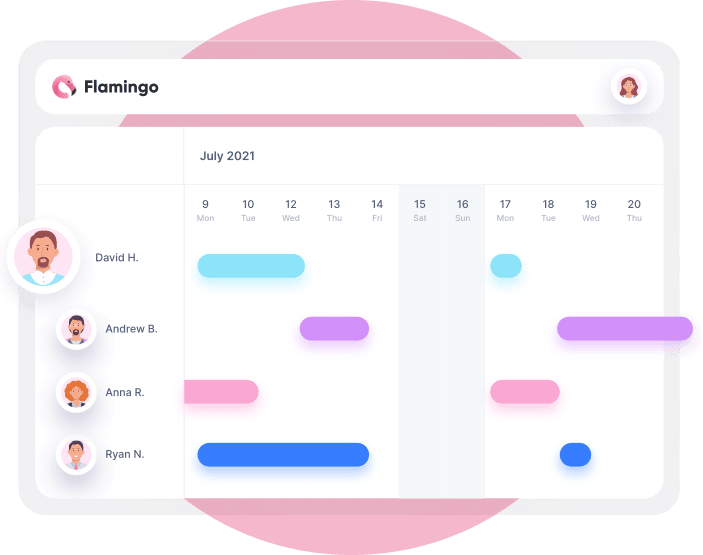
Flamingo is a leave management solution built for modern teams.
No more cluttered spreadsheets and manual data entry. Manage your entire team's leave, directly from Slack, and speed up your leave management workflow.
Learn moreDo you employ workers in Estonia, or operate in Estonia? If so, brush up on Estonia’s leave laws, and information such as public holidays in Estonia, annual leave requirements, sick leave, maternity and paternity leave, and more.
This page is intended for reference purposes only and does not constitute legal advice. Please see official government sources or consult a legal professional for actual legal advice.
Estonia observes the following public holidays in 2024:
| Date | Holiday |
|---|---|
| January 1 | New Year’s Day |
| February 24 | Independence Day |
| March 29 | Good Friday |
| March 31 | Easter Sunday |
| May 1 | Spring Day |
| May 19 | Pentecost |
| June 23 | Victory Day |
| June 24 | Midsummer Day |
| August 20 | Day of Restoration of Independence |
| December 24 | Christmas Eve |
| December 25 | Christmas Day |
| December 26 | Boxing Day |
In addition, the working days on the day before New Year’s Day, Christmas Eve, Independence Day and Victory Day are 3 hours shorter.
Employees who work on one of the above public holidays are entitled to either double pay or time off in lieu.
Workers in Estonia are entitled to 28 days of annual leave. Certain workers (such as minors and employees with partial or no work ability), as well as those in certain fields (such as education) may receive a higher annual leave allowance.
Holidays should be taken in at least one block of 14 or more consecutive days, and employers have the right to refuse leave of less than 7 days.
Annual leave is given for the following year, and expires after a year’s time. Employee’s can’t roll over annual leave indefinitely without it expiring.
Leave starts to accrue after someone has worked at least 6 months with the company, at which point they’ll be given leave in proportion to time worked.
Employees in Estonia cannot take a cash payment instead of taking their annual leave, except for any unused leave at the time their employment is terminated.
Employees in Estonia can take sick leave from work. In the case of falling ill or being unable to work, the employee can be compensated via a sickness benefit from the fourth day of the sickness.
The first three days are not covered, so are in effect unpaid sick leave. Days 4 to 8 are covered by the employer, while from day 9, the national health insurance fund covers.
The sickness benefit is 70% of the worker’s average wage (calculated over the last 6 months).
There are certain situations where the sickness benefit applies earlier (from the 2nd day of illness/injury), such as workplace accidents, or injuries or illnesses to pregnant women.
Employees can receive sickness benefits for up to 182 consecutive calendar days, should they be incapable of working during this time.
A woman is entitled to pregnancy and maternity leave of 140 calendar days. During this period they can receive a maternity benefit, from the nation’s Health Insurance Fund, equal to their average rate of pay prior to going on leave.
Maternity leave can be taken 30-70 days prior to the date of birth. If the mother begins her maternity leave later than this, those days are taken away from the 140 calendar days of maternity leave.
For example, if one mother takes maternity leave starting 30 days before delivery, she will receive 140 days of maternity leave.
If another mother begins her maternity leave 20 days before delivery, she will receive only 130 days of maternity leave.
Fathers can take up to 30 days of paternity leave. This can be taken any time between 30 days prior to the child’s birth, and when the child turns three years old. It can be taken all at once or in parts, and employers have the right to refuse paternity leave for periods shorter than 7 days.
There are special leave allowances for parents and caregivers of children or people with disabilities.
Parents (and official guardians) have the right to 10 days of unpaid parental leave each year, while they are raising a child up to 14 years of age, or a child with special needs up to 18 years of age.
In addition, both parents can use up to 10 days of childcare leave per child, until children reach 14 years of age. This is paid leave, paid by the state, at 50% of their regular salary (but not less than minimum wage).
Caregivers of an adult person with a profound disability are entitled to 5 days of paid caregiver leave each year. This is on top of their regular annual leave, and cannot be transferred to the next year.
There is no legal requirement to provide bereavement leave in Estonia.
Employees are entitled to up to 30 calendar days of academic leave each year. This is for attending trainings, and must come with a notice from an educational and training provider.
Public Holidays and Days of National Importance Act
This page is intended for reference purposes only and does not constitute legal advice. Please see official government sources or consult a legal professional for actual legal advice.

No more cluttered spreadsheets and manual data entry. Manage your entire team's leave, directly from Slack, and speed up your leave management workflow.
Learn more